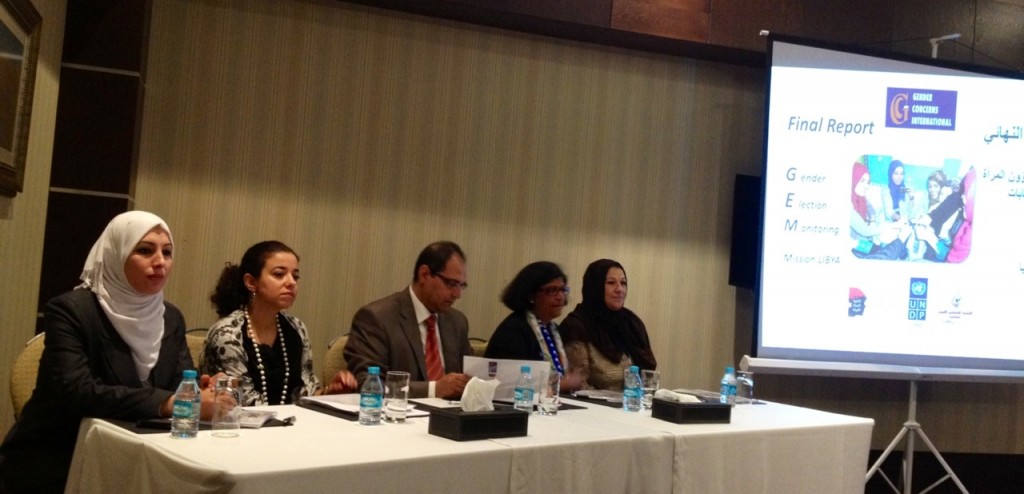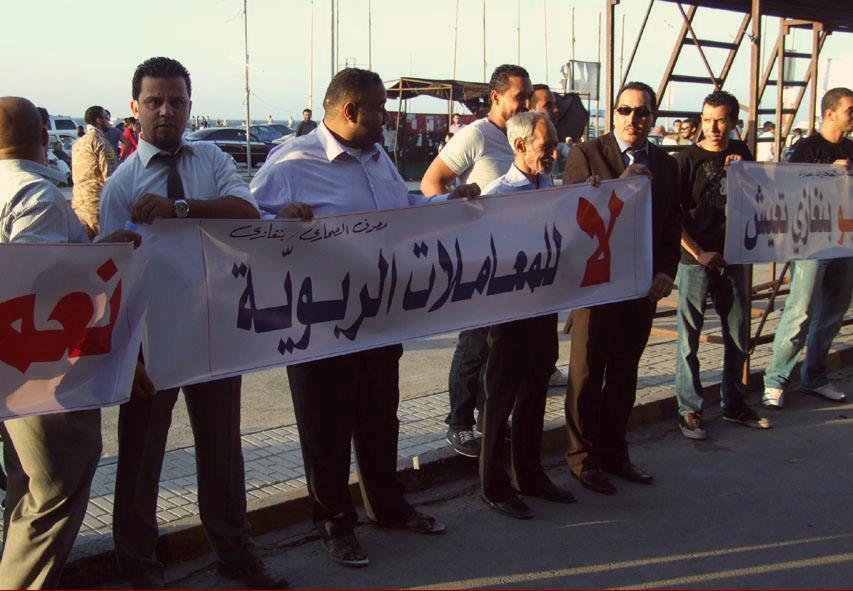By Nihal Zaroug.

Tripoli, 20 October:
On 18 October, the final report of the Gender Election Monitoring (GEM) mission in Libya, was presented . . .[restrict]to an audience of over 50 people, including the High National Election Commission (HNEC) chairman Nuri Al-Abbar, UNDP deputy director for Libya Dima Al-Khatib, and various figures from Tripoli’s diplomatic and NGO circles.
Sabra Bano, the director of Gender Concerns International (GCI), an organisation focusing on development from a gender perspective, presided over the event as head of GEM’s mission in Libya.
Developed by GCI, GEM is unlike any other elections’ observing mission as the entire team is comprised of women, ensuring that a women’s point of view is maintained throughout the observations. This approach supports the increase of women’s contributions and participation in politics and in the overall electoral process.
Prior to being invited to Libya by women’s organisation, GCI had observed Tunisia’s post-revolution elections and was consequently able to implement an intensive 10-day plan for GEM Libya.
The GCI and its partners; Libyan Women’s Union (LWU) and the Libyan Forum for Civil Society (LFCS), endeavored to train 25 Libyan female election observers and deployed them to eight regions across the country including Tripoli, Benghazi, Zawiyah, Obari, Sabha, Sabratha, Gherian and Jdabya. All of which could not have been possible without the support of the Libyan Electoral Assistance Project (LEAP), says Bano.
The domestic observers were aided by six female international monitors in observing the 7 July elections and collected data, which was presented in their preliminary findings a mere two days after the elections. This shows the teams’ dedication and hard work in conveying the success of Libya’s first election in over 50 years.
During her speech, Bano relayed that not only were Libya’s elections well planned and successful, but they represented significant gains for Libyan women, an extension of the role they played during revolution. However, Bano cautioned that “women’s empowerment achieved to date is a benchmark to beat and not a threshold to be maintained.”
During the voter registration phase, 1.3 million females registered to vote, 540 females registered as candidates on party lists (proportional system), and 85 females ran as independent candidates.
Female candidates on party lists won 32 out of 80 seats, which represents 40 percent in the General National Congress. According to GEM’s report, when compared to other countries that have adopted a zebra system for proportional representation, Libya’s 40 percent is “quite high”. Other countries that enjoy similar figures are the Netherlands, Senegal, Sweden and only Rwanda has a majority women parliament.
However, the result of the independent ballots tells another story. Only one female candidate was able to secure a seat out of possible 120 seats, signalling that a quota system for Libya maybe women’s best bet in securing seats in Congress. Although one seat is low, this figure fairs better than other Arab countries that have held elections within the last two years.
It should also be remembered that only 85 women stood for the individual seats, as against 2,415 men, having largely reached the conclusion that their chances of selection would be better served by concentrating their efforts on the party lists.
One HNEC member in the audience pointed out that the only independent seat won by a woman was for Bani Walid, a deeply traditional town. In his view this proves that the law and HNEC electoral regulations, do not prevent women from holding public office but it was the country’s “social temperament that stood in their way”.
On a similar note, HNEC chairman Al-Abbar, while addressing attendees, thanked GEM for their invaluable work and contributions to Libya’s elections and stated that if it were left to men, women’s political participation would not be addressed. Therefore, to increase women’s presence in the electoral process, one must “address the social and environmental restrictions”, said Al-Abbar.
Intisar Azzouz, an advocate of women’s rights, when asked how long it would take for Libyan men to champion women’s rights, answered with a drawn out “very long time” but this should not hold women back from “claiming what is rightfully theirs, as the law does not stand in their way” she added. Azzouz is of the opinion that the “sky is the limit” for women’s political participation in Libya.
The event concluded with an award ceremony for the 25 domestic observes, who Bano says were instrumental to the mission’s success.
GCI’s work in Libya, is not yet over, as their recommendations document the next stages for the role of women in elections. The organisation wishes to continue contributing its expertise to not only national election but also local elections. However, their involvement in the latter is not yet possible, due to staff restrictions.
For GEM’s final report see here . [/restrict]








